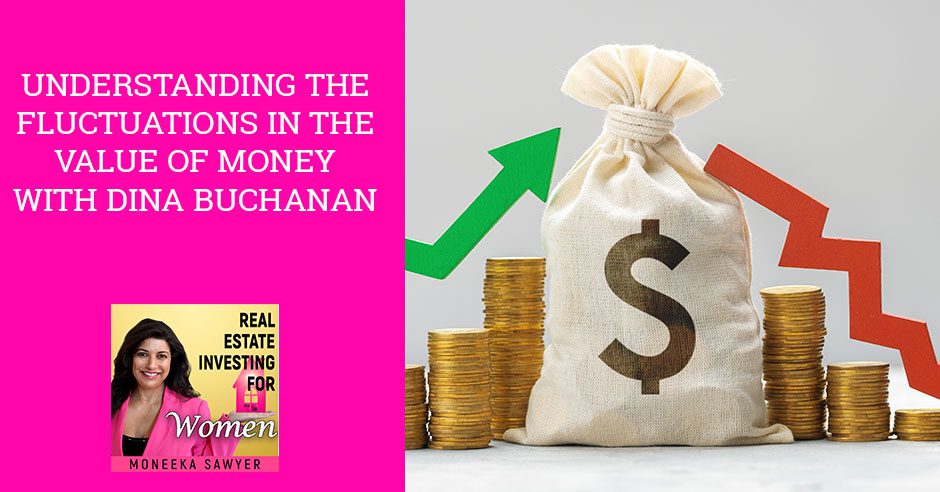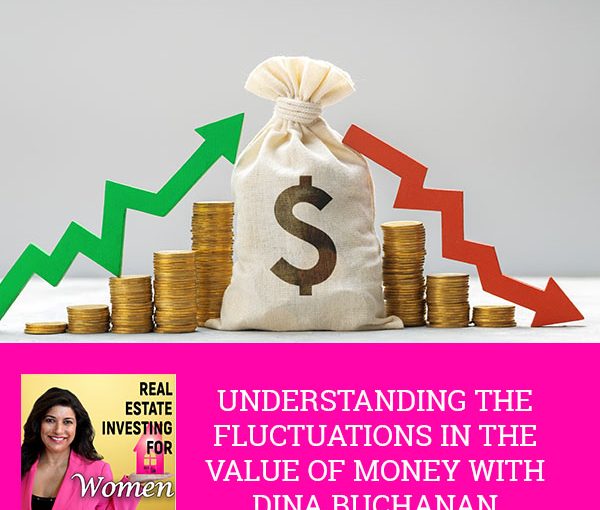Understanding The Fluctuations In The Value Of Money With Dina Buchanan – Real Estate Women

The value of money is decreasing because of how much is getting printed these days. In a span of six months, money is being printed in the trillions, and America is in debt. Discover how the value of money fluctuates with your host Moneeka Sawyer and her guest Dina Buchanan. Dina is the Director of Investor Relations and Business Development of the PCRP Group. Join them as they dive into the supply and demand of money and discover the difference between real estate and stock. Stop treating money like it’s a commodity today!
—
Watch the episode here
Listen to the podcast here
Understanding The Fluctuations In The Value Of Money With Dina Buchanan – Real Estate Women
Real Estate Investing For Women
I am so excited to welcome back to the show our guest Dina Buchanan. You met Dina when she talked about syndication and doing that in climate-resilient markets. She and I had this conversation about the value of money and how money is losing value. It’s such a deep topic. It has come up several times on this show and I liked the way that she talked about it.
I thought I would bring her back and we could discuss, as she says, unpack the concept so you, ladies, understand the way that investors, financial professionals, and people that have been in the industry for a long time and study money how we look at money to give you a perspective on that. Before we get moving, let me re-introduce Dina.
Dina is the Director of Investor Relations at PCRP Group, a firm that provides direct access to tax-advantaged, passive income, and commercial real estate opportunities. Dina has been investing in both residential and commercial properties in the United States and internationally for years and has been responsible for overseeing approximately $200 million of assets under management.
—
Welcome back, Dina. It’s so nice to see you.
It’s so nice to see you too and thanks for welcoming me back. It’s a pleasure to talk with you again. It’s so fun because when you meet people that are like-minded and you gel on the same topics, it makes them more fun to talk and learn about. The learning is so much more impactful because we learn from each other when we have in-depth conversations. They’re serious but they’re also interesting. It’s stuff that we can implement in our lives when we understand all about money. What we were talking about was financial education, money and what that means.
A lot of people, myself included, wondered. I remember thinking money was something like when the government is going to pay for this or is going to take the money and pay for this, where did it come from? We know that people pay taxes, businesses pay taxes and everybody’s probably aware that we were in a huge deficit. I’m not sure if everybody knows what that means but it means that we are printing more money.
Here is a little history lesson. Back in 1971, President Nixon took us off the gold standard. What that means is every dollar that was printed before 1971 was backed by that exact amount of gold in the treasury. If somebody had $100, it was like they had $100 worth of gold. Since he deregulated that, money can be printed. The reason he deregulated it is because we owed money to another country. He printed that money to pay back that debt.

Value Of Money: People can get together and say that to retire into the lifestyle they want, their money needs to duplicate itself faster. It needs to be able to go in and compound.
The issue is the amount of money that’s being printed. Think of March of 2020 to October of 2020. Do you have any idea how much money was printed during that six months? It was $4 trillion. How do you wrap your head around that? When the government is printing money, a lot of people don’t understand what that means for them and their dollars. Every time the money prints, the value of money goes down. In other words, the more dollars that are in circulation that are not backed by gold, the less they are valued.
This is the interesting thing of what we hear about money, “The government is printing money and we were at a huge deficit.” People are like, “That doesn’t affect me. No big deal.” Think of it as supply and demand. The more dollars there are out there, the less they’re worth. It’s basic economics. Let’s think of a Model 3 for the Tesla, which we’re trying to buy.
It’s in labor and production but there were very few. I had to wait three years to get my Tesla. I was willing to pay more for that because there were fewer of them. As they become more mass market, I don’t know what Tesla is going to do about it. I’m not sure that was a great example but it is a supply and demand thing. The more that there is, the fewer people value it. Therefore, its value will go down. Is that true?
That is very true. With money, the one element that is problematic is people do value money. What they are valuing is going down and that’s the problem. People are treating money like it is a commodity. For example, if somebody has $1,000 and they put it in a savings account. What are the rates that savings account pay? I don’t even know. It’s probably 1%. Maybe less like 0.5%.
When you do the math on that, it’s not worth it but yet a lot of people say it is safe. People like us are going, “I want my dollars to make more money than that because saving is not going to make money.” Think about it if money is losing value, the rate of inflation. What is the rate of inflation? Four percent, that’s what they tell us, anyway. They don’t include food and fuel in that as you probably know.
I want to unpack that. I would love your input on this, Dina, when we talk about the cost of living and cost of living increases. When many people have a job, each year they get a raise, hopefully. That’s a cost of living raise. The cost of living raise is 3% usually. You say, “I got a 3% raise. I’m keeping up with how fast the economy is growing.” That’s how the layman might think like, “That’s great. I’m keeping up.” What happens as you notice ten years later? “If I’m keeping up, why do I feel so far behind?” The reason is that at 3%, we’re not keeping up. Do you know why?
It’s because when the government calculates the cost of living, they are not including housing, food or fuel. Those are the things we need. Dina said to me, “Could you imagine putting together your monthly budget and not including the cost of housing, food and fuel? What kind of budget is that?” It’s true. That is what the government does.
Stop treating money like it’s a commodity.
It’s like taking your money and saying, “I don’t have to worry about any of that. I’m going to take it and go shopping.”
People do that, and then they end up in huge debt. That’s the thing. Why we’re having this conversation is to get it real so that people understand how money works. The cost of living is not 3%. If you calculate everything in Dina, what would you say it is? I would say between 6% to 8%.
I would venture to say at the rate that they’re calculating money, it’s probably closer to 10% and we’re nowhere near that as far as the cost of living raise. Here is the worst part because with what you are saying, I 1000% agree. The worst part is people are thinking and believing that they take that thousand dollars.
If you take money that is losing to, your example, 6% and you’re going to put it in a savings account that is making 0.2%, money is going down 6% and there’s only a bump up of 0.2%. You’re in a deficit of 5.8%. This is why people can’t keep up no matter what their spending habits are. It has less to do with that. The way we make money is to have money duplicate itself, and because it’s losing value, it’s not going to duplicate itself. You’re number 6 to 8 more times somebody to be able to retire into the lifestyle that retiring out of. That’s significant and huge.
6% to 8% is to keep head above water. That’s keeping even, but if you want to retire, you got to add a percentage above that. We were not just head above water. We were increasing our net worth. Our money is increasing its value. That is why when we talked to Dina about syndication. She said, “You’re going to get double-digit returns.” Here is an opportunity to make more than the 8% to 10% that keeps you completely level. You get to keep this lifestyle but there is no opportunity for growth. You get to stay as you are. If you love what you are but you’re going to have to work until the end of time. There’s no opportunity.
There’s one other thing too. It would be one thing if we were stopping here. What you’re saying is true. As long as we stayed here and there was no more money printed but we already know that’s not going to happen, it can’t. This is a great little piece to unpack. Somebody asked one time, “What are they going to do?” I said, “Look at it this way. Let’s say that you were on a budget for a household. You had two kids and you promised them you would pay for college. That was part of the plan. Let’s say they both get to the point where they’re eighteen. They come up like, ‘Mom, I’m ready to go to college. Where’s my college money?’” You’re like, “I don’t have it.”
Here are my two choices. I can go back on the promise or borrow. The governments are in the same position. All the things they promised, they have to pay. They either have to default on their promises or print more money to keep them. Psychologists say the best predictor of future behavior is past performance. What have they always done in the past? Printed money. What are they going to keep on doing? Printing money. A lot of people will say, “Raise taxes,” but that won’t work. If it were that easy, they would have already done it. The reason it won’t work is our tax code is capitalist. It’s structured that we are allowed to make as much in our country. We can keep on making a lot of money.

Value Of Money: The difference between a stock and real estate is that real estate is tangible. It’s a product that people need. A stock is not necessarily a product that is needed.
We want it to stay that way and we want that freedom. The tax code, the way it’s written, is about 14,000 something pages. It allows business owners who do create jobs to get tax breaks. We don’t want to hurt the business owners because they will create fewer jobs if we do. Hence, there will be fewer people at work. It is a very delicate balance. This is where we, as women and people, can get together and say, “For me to retire into the lifestyle that I’m in or want to increase it, my money needs to duplicate itself faster. It needs to be able to go in and compound.”
It’s that Rule of 72. If we go back to that and we look at that in the previous video, we look at, “How many years is it going to take from my money to double? If I put $100,000 into this syndication and I can double it in 3 to 5 years, there’s no way $100,000 in a savings account at those rates is going to even compare or compete with that.” That’s the bigger picture.
Let’s say we were doubling our money in syndications, not always but let’s say we could do that 5, 7 to 10 years. Syndication gives you access to this but most real estate that you invest in has a built-in accommodation for the cost of living. One of the things that’s amazing about real estate is the values move up as inflation goes up. It moves with the markets. When you invest in the stock market, it also moves with the economy but it is not stable. Real estate is what I consider the truest depiction of the economy’s movement. Am I saying that clearly, Dina? Can you say it in another way that makes more sense?
I do get asked the same thing a lot of times. The truth is, we can make money in both stocks and real estate, for sure. I do think education is key but the difference between a stock and real estate is, real estate is tangible. It’s a product that people need. A stock is not necessarily a need-based product. It means people need land to grow food on, shelter and a place to do business. What the tangibility that you’re referring to why it dominates a lot of times the market and the valuation of markets is because it’s a necessary item. It’s that supply and demand thing again. That’s the big piece that you’re hitting on that makes me go, “What’s powerful about this is if we are investing in something, that’s tangible.”
Real estate markets can go down because that’s another thing people say. Are you telling me they never go down? They do. If we look back in history, that does have ebb and flow. However, over ten years, the National Association of Realtors will tell you, “Real estate increases approximately 10% across the board every decade.” That means it increases. It’s eventually going to go back up and you have got that supply and demand. That is what’s going on. There are affordable housing needs. This is why multifamily is so impactful. If you bring the resilient climate piece into that, which everybody should be aware of, that’s the piece that I am passionate about. We reduce our carbon footprint so when we can do multifamily.
We can get some great tax incentives in certain places when we’re doing energy-efficient upgrades in our buildings. All of these things together can create that portfolio that allows an investor to duplicate their money on a faster level. That’s the game we were playing with money. It’s quicker. The money can reproduce itself. The more comfortable retirement will be, the more comfortable life will be. You don’t have to worry about what Elon Musk is doing and what is the price of Teslas. Maybe we could take a trip on Blue Origin. It’s different.
For me, it was never about the stuff. Although, we have stuff and we love to travel. We all have our things but it’s about the fact that I don’t have to worry about that stuff. It’s a tool and it allows me to be 100% who I want to be in the moments that I want to be that person. That’s the big piece that we’re both passionate about. We get to do what we do, help lift people and understand this.
The best predictor of future behavior is past performance.
I have often said in schools, I don’t know that I ever used Calculus. I had to take it when I was in college and high school. I don’t even remember it. My kids will ask me, “How?” “Ask your dad. That’s not mommy’s thing. Ask me ROI and how you can duplicate money. I can tell you that.” It is a better skill for a kid to go out into the world with. If you are going to be a rocket scientist, you need Calculus. If you build a Tesla, I don’t know.
Dina, there is another thing that I wanted to ask and we were going to wrap up this show with this because this is a huge amount of information. Ladies, I hope that you appreciated Dina’s perspective on this. We broke this down so that you got a perspective, maybe a different way to look at money. Dina, thank you so much for sharing that. In EXTRA, I’d like to go even a little bit deeper because I got the question from one of my ladies. She bought a house. It was a $1 million home and she got an $800,000 loan. She was like, “How am I ever going to pay this off?”
You have a response to that. I know what my response is to that but we were going to talk about that EXTRA because that brings it home for us. It makes it real. What should our perspective be on that? Let’s talk about that in EXTRA but for now, Dina, remind everybody how they can get in touch with you.
You can find me at PCRPGroup.com. Go to our website. We’ve got tons of free information and education. We’re doing a webinar series that we were releasing at the beginning of January 2022. Also, you can always email me at [email protected]. Any questions that anybody has or if you want to talk about passive investing, I make myself open to your audience.
Ladies, as always, let Dina know you came from this show. It’s good marketing information for her as well as for me. Please let her know that you came from Real Estate Investing For Women from Moneeka Sawyer. Dina, thank you so much for all that you shared in this show.
You are so welcome. Anytime. My pleasure.
Ladies, watch out for EXTRA. We’re going to be talking about how do I pay off that house or should I? Go to RealEstateInvestingForWomenEXTRA.com if you’re not subscribed but would like to be. Remember, you get seven days for free. For those of you that are leaving Dina and me now, thank you so much for joining us. I hope this is helpful. I look forward to seeing you next time. Until then, remember, goals without action are dreams, so get out there, take action and create the life your heart deeply desires. I’ll see you soon. Bye.
Important Links
- Dina Buchanan – Past episode
- PCRP Group
- National Association of Realtors
- [email protected]
- RealEstateInvestingForWomenEXTRA.com
Love the show? Subscribe, rate, review, and share!
______________________________________
To listen to the EXTRA portion of this show go to RealEstateInvestingForWomenExtra.com
To see this program in video:
Search on Roku for Real Estate Investing 4 Women or go to this link: https://blissfulinvestor.com/biroku
On YouTube go to Real Estate Investing for Women
Moneeka Sawyer is often described as one of the most blissful people you will ever meet. She has been investing in Real Estate for over 20 years, so has been through all the different cycles of the market. Still, she has turned $10,000 into over $5,000,000, working only 5-10 hours per MONTH with very little stress.
While building her multi-million dollar business, she has traveled to over 55 countries, dances every single day, supports causes that are important to her, and spends lots of time with her husband of over 20 years.
She is the international best-selling author of the multiple award-winning books “Choose Bliss: The Power and Practice of Joy and Contentment” and “Real Estate Investing for Women: Expert Conversations to Increase Wealth and Happiness the Blissful Way.”
Moneeka has been featured on stages including Carnegie Hall and Nasdaq, radio, podcasts such as Achieve Your Goals with Hal Elrod, and TV stations including ABC, CBS, FOX, and the CW, impacting over 150 million people.

